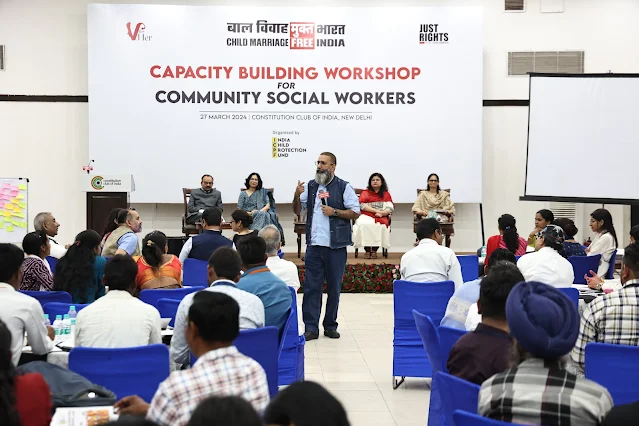To ensure that no child is pushed into child marriage during the upcoming wedding season in the country, community social workers (CSWs) of various NGOs of the Child Marriage Free India coalition got together to chalk out a strategy for the same in Delhi.
The ‘Capacity Building Workshop for Community Social Workers’ was organized by India Child Protection Fund and supported by ‘V For Her Foundation’ and ‘Just Rights for Children’.
As the wedding season is around the corner, this is an important time for the CSWs working at grassroots to stop child marriage as thousands of children will be pushed into marriage during this time across the country.
Akshaya Tritiya is especially a vulnerable time when instances of child marriage are high in various states such as Rajasthan, Uttar Pradesh and Madhya Pradesh. Child Marriage Free India campaign is a coalition of 161 NGOs and is well on its way to reach tipping point to end child marriage and end this crime by 2030.
Speaking at the event, renowned activist and author, Bhuwan Ribhu said: “India is well on its way to achieve the Sustainable Development Goal against child marriage by 2030 and the momentum which has been built in the last one year through the efforts of the NGOs and the local governments need to be strengthened and expanded across India where the problem is most acute."
He added, "This one month is a critical time in the fight against child marriages as community, panchayats, NGOs, local governments at block, district and state levels can take urgent action to ensure that no child is married at Akshaya Tritiya (May 10-11)."
He further said, “Child marriage is a global problem but no country in the world has made the progress in policies and their implementation and for the achievement of SDGs as India has. And the real success of ‘Beti Bachao, Beti Padao’ is in the elimination of child marriage.”
Strategies were formulated and future course of action decided to ensure that no child is pushed into marriage during the vulnerable time of 2024
Bhuwan Ribhu’s recent bestseller ‘When Children Have Children: Tipping Point to End Child Marriage’ has proposed a blueprint to reach the tipping point of child marriage by 2030 and is being adopted by civil society organizations and governments across the country for this.
The latest National Family Health Survey V (NHFS 2019-21) revealed that 23.3 percent of girls in the age group 20-24 were married before the age of 18 in the country.
Speaking at the event, Rajeev Bhardwaj, Trustee, India Child Protection Fund, said, “Child marriage is a scourge on all our child protection initiatives and has no space in today’s world.”
During the workshop, the CSWs from various states discussed the challenges they face in the villages while stopping child marriage, and were imparted knowledge and space to share experiences, challenges and learn from each other during the capacity building workshop.
Law, which remains one of the most crucial aspects in this fight against child marriage, was discussed at length during the workshop. With experts present during the workshop, strategies were formulated and future course of action decided to ensure that no child is pushed into marriage during this vulnerable time of the year.
From getting injunction orders from the courts to prevent child marriages, to studying the demography of each village to know the number of vulnerable children, to putting posters outside religious places giving stern message that no child marriage takes place in that place, to writing punishment for marrying children on the Panchayat notice boards in every village, the workshop listed out several steps to ensure that child marriage doesn’t take place this wedding season.
---
*With Bachpan Bachao Andolan



Comments